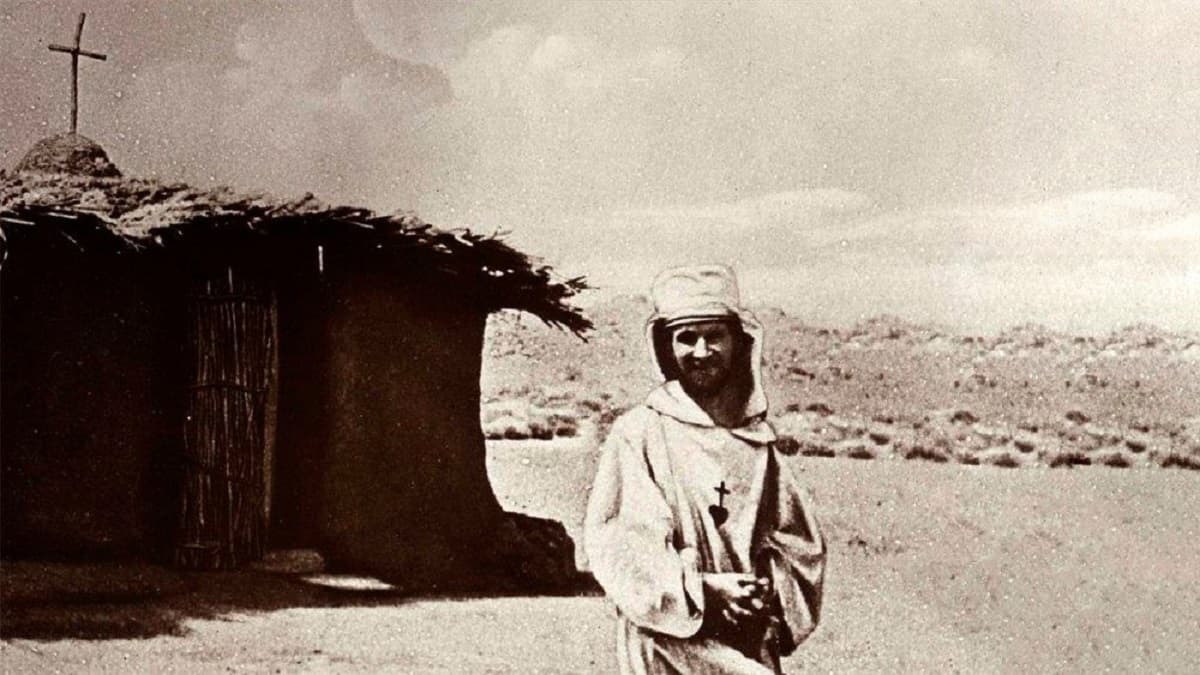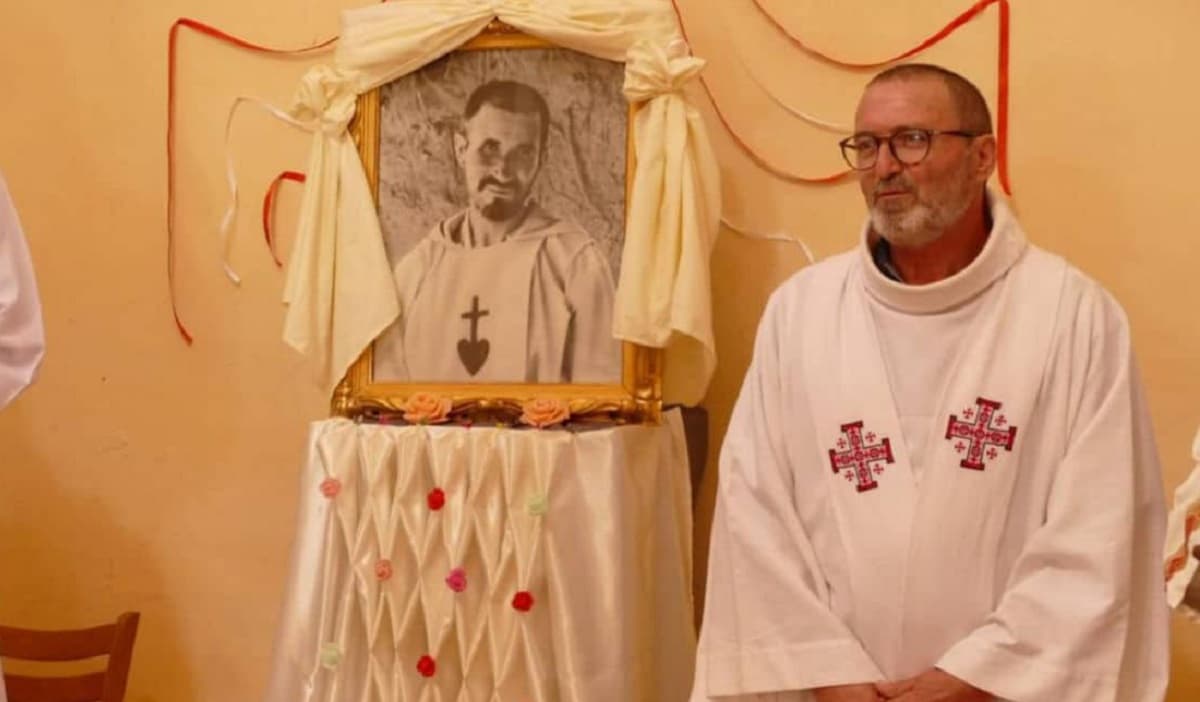Charles de Foucauld is already a saint. On May 15, he was canonized along with nine other blesseds in Rome, in the first major celebration of its kind after the pandemic. More than 2,500 kilometers from there are the remains of “brother Carlos”, who rest in a simple tomb, how could it be otherwise.
And as custodian of his tomb in the Algerian desert appears the Spanish priest Jesus Cerveramissionary fidei donum Valencian responsible for the parish that is next to the remains of this universal saint who bore so much fruit after his death.
December 1, 1916 Saint Charles de Foucauld he was killed by Touareg rebels. His body was buried right there, in Tamanrasset, and in 1929 transferred to the Algerian desert, specifically to the only closest Christian cemetery, although 1,000 kilometers from where he lived in El Menia.
What is this missionary doing in the middle of the desert?
This question will have been asked on numerous occasions to Jesús Cervera, who, following Foucauld’s spirituality, wanted to be sent there. And in El Menia he does the same as the now saint, to be present, to show the love of God with his mere presencesince there are no local believers there and it is not allowed to evangelize.
As told to Archbishopric of Valencia, Cervera is in charge of the parish located next to this cemetery. In it, he says, “there are no Christian believers there, since it is a one hundred percent Muslim area, and the only ones there are foreigners”. Along with him are other priests of different nationalities and the Sisters of Our Lady of La Salette.
Jesús Cervera arrived as a missionary in the Algerian Sahara in September 2019.
His mission there, where it is forbidden to preach or make any religious manifestation in public, is the same as that lived by brother Carlos de Jesús, which he called the life of Nazareth. “Here we are nobody and our mission is to be witnesses of the good things that God doesof the Gospel of friendship”, points out Jesús Cervera.
As the Valencian priest explains, “when he lived among the Tuaregs, brother Carlos wrote: ‘my life is spent praying to the good Lord and receiving the neighbors who come to my door’ and this is our mission, to live the gospel of friendship”.
Cervera tells from Algeria: “the door of my house is always open, and not in a metaphorical wayIn addition, I make many visits to the people with whom I have established friendships and relationships”, also to the sick.
In fact, he claims that at this time has forged great friendship ties with some Muslimsthey have invited him to weddings, in addition to attending their funerals, or helping the most needy families with food.
Another of the tasks that the priest does is visiting prisoners, since a large number of African Christians are detained in this area, from other countries of the continent, who have arrived there fleeing from wars, hunger and death. She also collaborates with the sisters in caring for the disabled.
Families and groups of pilgrims usually go to this area, El Golea, where the new saint is buried, although, as the Valencian priest details, “In these years, due to the pandemic, there have been very few.
The spirituality of Saint Charles de Foucauld
Humanly speaking Foucauld would not be considered a successful character. In life he went to live in the desert, and there apparently the fruits were not fruitful. But From his spirituality and his writings, a multitude of groups and communities have sprung up throughout the 20th and 21st centuries. eager to “desert with God” in the midst of the banal hustle and bustle of modern and postmodern times.

This former French soldier who converted after a youth of vanities and brawls, became a hermit priest in the Sahara desert, was assassinated in Tamanrasset (Algeria) in 1916, in a seemingly forgotten corner of the world. Y a century later he is a truly universal saint. This is the faith, this is the Church and this is the vision of God that many cannot understand.
A spirituality that has spread in the 20th and 21st centuries
In 1955 the Association Famille Spirituelle Charles de Foucauld had 8 groups or fraternities (little brothers, little sisters, secular fraternity, priests, etc…), but hToday there are more than 20 associated groups or movements in various countries, with more than 13,000 members.
His spirituality of abandonment, confidence and simplicity, which goes well with that of other modern saints such as Therese of Lisieux or Brother Raphaelalso influenced many renewed and semi-monastic-style communities and Eucharistic devotion in francophone countries from the 1950s and 1960s.
Difficult youth and conversion at 28
Charles de Foucauld was born in 1858 in Strasbourg. His adolescence was difficult due to the death of his parents, and his career in the army was conflictive and quarrelsome. In Morocco, being a soldier, he fell in love with the Sahara and its landscapes. Back in Paris, restless and exhausted, full of vital questions, he met Father Henri Huvelin, a brilliant intellectual. At the age of 28 and after much thought, Foucauld converted to the Catholic faith and understood that God is not “one more thing”, but that he must give him his whole life.
He tried to serve God as a Trappist, went to the Holy Land, became a priest… but it was difficult for him to find his place, which in the end was to evangelize in the Sahara, a Muslim land. He built two small huts, two lost villages in the desert, surrounded by Tuaregs.
There he served the poorest of the poor, evangelizing with his example of love and poor service. He lived a spirituality of austere love before Christ in the Blessed Sacrament.
He was murdered by outlaws in 1916 when he was 58 years old.
At first glance, his choice of desert was not very fertile: almost no converts, places without people, little visible fruit… but a hundred years after his death, it is amazing the number of souls and communities he has fed with his writings and their example. Its fertility in the Church of the 20th century is today unquestionable.

